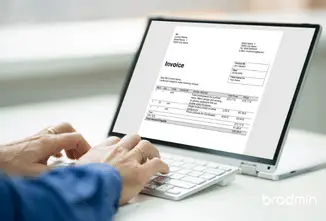Claiming a late payment fee can be the difference between being able to invest and going bust.
Using the Late Payment of Commercial Debts to your advantage can free up capital and get back money that you are owed.
We will show how to claim interest and compensation on an overdue invoice.
In this article:
When is an invoice payment late?
The late fee law in the UK is very clear about what precisely a late payment is and when to apply a late payment fee. The Late Payment of Commercial Debts Act was implemented in 1988 to provide General Protection for small businesses.
An invoice that is not paid by either 30 days for dealings with the public sector or 60 days with private business transactions is legally considered a late payment and is eligible for the late payment fee for overdue invoices.
For private businesses, this period can be agreed to be later as long as it is fair to the creditor. Anything that the courts consider unfair can be reverted to the 30 days / 60-day time limit, even if this contradicts the contractual agreement.
An example could be that a private business has included a 90-day late payment fee in a contract with a sole trader. If this date was viewed by the courts as being unfair to the smaller business, the court can overturn the date and apply the law from a different date.
What is a late payment fee?
If an invoice debt is not paid by the time of the late payment date (whether that be in accordance with the Late Payment of Commercial Debts Act or otherwise stated in the contract), it becomes a late payment and eligible for an additional late payment fee.
These payments are set by the Late Payment Act and are set depending on the size of the debt and the base rate set by the Bank of England. As soon as a payment becomes late, the creditor can claim the late payment fee. [1]
How do late payment fees work?
After a payment becomes late, a creditor can send a late payment invoice to a debtor. This will include the original due payment when the payment became late, and the additional interest and fixed sum that can be added to the payment.
Using our handy late payment fee calculator, a creditor can find out how much they can legally add to their original invoice. It can also be worked out as 8% of the initial debt, plus the rate set by the Bank of England.
As the analysis of sales ledgers and working out the correct interest rate can be time consuming, finding professional assistance can help a small firm in successfully claiming for late fees.
When can I charge late fees for invoices?
One of the biggest problems for small businesses is that they don’t know how to define a late payment fee. Learning how the government has introduced legislation to remove as much ambiguity as possible is key to successfully claiming what is rightfully yours.
You are legally entitled to charge late fees for any commercial debt that passes the late payment date. That includes late payment dates according to the Late Payment Act or conditions otherwise agreed in contracts.
If a small business has had an unfair late payment date imposed onto a contract, they can charge late fees from 30 days or 60 days (depending on the kind of deal). Seeking legal advice before charging fees outside of a contractual agreement is advised, however.
If a company has received late payments in the past, they can also claim late payment fees retrospectively. As this requires a strong understanding of the legislation and expert analysis of sales ledgers, expert advice is recommended for these situations.
How can I include late payment information on invoices?
This process is relatively simple – in addition to all information that you would have on your standard invoice, a section explaining any additional fees should be added. This will include interest added, fixed sum added, and any compensation for chasing the fee.
How do I charge late fees on an invoice?
After consulting our late payment calculator, calculating late payment fees, and adding the fixed sum and appropriate interest, sending a revised invoice to the debtor including the late payment is the next best step.
Before sending a late fee invoice, it is better to have spent time reminding debtors about the due payment before the deadline. Keeping in contact and maintaining a dialogue so late payment fees can be avoided will aid business relations more than claiming debts.
If this has been unsuccessful, you may require to take legal action and go through the courts. This can be difficult for small businesses. Finding representation can aid in working out the interest and any recovery costs, as well as bringing the case before a judge.
How much can I charge for late fees?
There are two elements to claiming late fees – a fixed sum, based on the debt owed, and interest of 8% plus the rate set by the Bank of England.
The fixed sum can be worked out from this table:
| Debt | Compensation |
|---|---|
| Up to £999 | £40 |
| £1,000 to £9,999 | £70 |
| Over £10,000 | £100 |
Although these look like relatively small sums, they add up if you have multiple late debt payments to claim. Claiming multiple small compensation sums from a large number of late invoices will create a great amount of free capital without any extra work!
Additionally, in accordance to the Late Payment Act, interest can be added. If there is a debt of £1,000, the creditor can claim an additional £85 from the debtor (assuming interest of 8% plus Bank of England rate of 0.5%). See our late payment calculator for specific help with working out the interest owed.
If you have had to follow up a debtor in order to claim late payment, you can also include reasonable compensation for having to chase a late fee. As this fee has to be judged to be reasonable, consulting expert legal advice should be considered.
Gaining late payment compensation is an easy way to claim what is yours and also adding capital for no extra output. Not chasing up bigger enterprises that are negligent with their payments can only harm small businesses.
What exactly is the compensation for chasing late fees?
There is no specific advice on this from the government. The only guidance is that the compensation must be reasonable, which means seeking advice is strongly advised before charging your debtors.
Although the government has left the specifics out, it is thought that a growing body of case law (past cases which have gone through the courts) will guide future advice on the matter. Instead of the government providing an exhaustive list, they want to courts to judge what is fair and what is not.
Are late payment fees enforceable?
Before being eligible to claim late payment, you must show that you have made sufficient contact with a client in relation to the debt. This can include calls, emails, letters, or any other correspondence for the purpose of reminding the debtor of their due payment.
You must also be able to show that you have been reasonable in your approach towards the client – if a trader has been threatening with their debtor, the courts will not judge this as reasonable and the trader may lose the case completely. Maintain professionalism and chase up debts in a reasonable manner or else you may lose any claim you have at all.
If you can show that you have made reasonable attempts to claim the debt before the due date and the late payment date passes, then sending an overdue payment reminder or a late payment invoice is the next step.
If the debtor fails to pay after receiving a late payment invoice, the creditor can claim the payment through the courts. This may require expert advice from solicitors or debt collectors, depending on the structure of the company.
Remember, being able to show that you have made reasonable attempts to claim the debt before the late payment date has passed is key to successfully claiming late payment fees. Keep records and clearly present them to your debtors and, if necessary, court representatives.
How can late fees help my business?
If a small business has suffered from a number of late payments, consulting expert financial advisors can lead to a quick injection of capital for reinvestment without having to provide a service. Which small businesses are going to turn that down?
The Late Payment Act was introduced to free up funds for small businesses and hold larger businesses to account – this will allow small business owners to focus on growing their business instead of chasing payments from negligent enterprises.
The British Government wants to present the British industry as paying promptly and dealing fairly with all other trading partners. If a small business has been treated unfairly in a business transaction, government advice is that they should be compensated for their suffering.
In addition to the cash injection, it will also show your business partners that you expect business to be completed promptly. Including late payment dates and fees in the contract will help small businesses manage their finances and professional relationships in a more effective way.
How can I create a late payment policy?
One of the best things about the Late Payment of Commercial Debts Act is that it is very easy to implement in your contracts and invoices, should you need to. Referring to the Government website allows you to see exactly how the legislation is worded.
Including the legislation, as written will allow you to inform your clients that you understand how to use the Late Payment Act and will present yourself as clear, open, and professional. You could simply add the appropriate late payment periods, interest rates, and fixed sum table for an easy update.
If you plan to work outside the Act, you will need to state clearly when the late payment periods begin. The policy should also include a section stating that the Late Payment Act will be reverted to in the event of an unfair late payment period.
Having this legislation set out clearly in a policy and included in your contracts will tell customers about incentives and charges at the point of sale. This will allow for easier communication when chasing debts in the future. Remember, communication is key.
Can freelancers issue late fees?
Yes, anyone from sole traders to large enterprises can claim late fees. 43 percent of freelancers report at least one unpaid piece of work, so having a robust understanding of the late payment act and debt recovery is key.
As a freelancer, you are eligible as a sole trader to claim back payment from late paying clients. Along with partnerships and SMEs, you have just as much right to claim fees for an overdue invoice.
Are late payment fees legal?
Yes, late payment fees are legal and encouraged by the government. This is not to encourage small businesses to claim the fees, but to encourage all businesses to pay their debts promptly and efficiently.
Referring to the Late Payment of Commercial Debts Act allows debtors to claim within the guidance of national law and know exactly how much is owed to them. As this can be time consuming, referring to legal advice and representation can be an effective way to use the law to your advantage.
Additionally, Westminster wants to prevent and deter big enterprises from failing to pay their debts. Building Britain up as a place of business needs all businesses to pay their debts and reinvest capital. In order to do that, the Government is pushing for small businesses to claim what is rightfully theirs.
Are late fees always reasonable?
Due to billions worth of capital being tied up for small businesses every year, late payment fees are necessary to ensure that UK business men and women can claim and reinvest their capital efficiently.
Encouraging larger businesses to deal with debts allows small businesses to thrive. Many sole traders, partnerships, and SME worry about angering larger enterprises by claiming late payment fees but failing to do so causes half a million UK businesses to fold every year.
In conclusion
Using late payment fees to your advantage can add much-needed capital to your business as well as showing your clients that you have robust contractual policies about prompt pay. Presenting your business as professional, thorough, and with a keen eye for detail will help you in the long run.
Small businesses need to make sure that they follow all legal advice concerning the Late Payment Act – the Government is promoting professionalism and promptness in business transactions, so use their support to legally claim what is rightfully yours. [2]
Lastly, the Late Payment Act is a deterrent for larger businesses but also protection for smaller ones. Use this legislation to grow your business, reinvest capital, and take your dealings to the next level.
Now it’s over to you.
How do you deal with late payment fees?
Are you charging your clients?
Let us know in the comments below.
8 Comments
Comments are closed.




![Apology letter for late payment to supplier [with examples] 5 apology letter for late payment to supplier](https://brodmin.com/wp-content/uploads/2021/09/apology-letter-for-late-payment-to-supplier.webp)
![Invoice payment terms - UK edition 2022 [+ Net calculator] 6 Invoice Payment Terms UK Edition 2021](https://brodmin.com/wp-content/uploads/2021/09/Invoice-Payment-Terms-UK-Edition-2021.webp)






The question is: should a business charge late fees for invoices when their client can become a regular one? What I mean to say is, would charging them late fees somewhat ruin our relationship? I have had a client that I wanted to charge late fees but didn’t because he mentioned he wanted to work more with my business. I trusted him and he didn’t come back. Now, I can’t know for sure which clients may or may not come back but what would be a good rule for this kind of thing?
Hi Alan, sorry to hear about your experience.
I guess each client relationship is different, and you are right, charging late fees will sour or could end your relationship with that client. You’ll be the best person to make that call.
The one thing that you can do is, report those clients that have not paid you on time on our directory. You can report them anonymously if you are worried about affecting your relationship with that client.
Thanks for the reply, Kris. Yeah, I guess it’s something I have to decide on and take it one client at a time. Sometimes reporting them anonymously may be warranted or if they seem like they don’t care, I may report them with full details.
You gave the example of a private business including a 90-day late payment fee in a contract with a sole trader. This is what happened to me. I’m on day 94 now and my client has not yet paid. I’m not looking forward to going to court but we’ll see. What are my options?
Hi Matilda,
Sorry to hear that one (?) of your invoice is already 94 days late.
I assume that you have already sent reminder emails? Maybe even a phone call?
You could consider adding late fees and charges?
Here is a free calculator that can help you work out how much you can charge (here in the UK).
https://brodmin.com/payments/late-payment-of-commercial-debts/#Commercial-debts-calculator
Some months back, I started including late payment information on all my invoices. I’ve had 2 clients complain a bit about these changes but they have eventually accepted them. Since then I only had one serious problem from a client that just didn’t want to pay so I had to have a lawyer call him and explain what could happen. The next day he paid in full.
I bought an item via an online Auction on Sunday 21st, and the contract says to pay within 7 business days. I paid on Tuesday 30th. The company then charged me for late payment fee’s at 5% plus VAT, as stated in their contract, which came to £244.45 plus 20% VAT. Is this legal? If I take it to a Simple Procedures Court in Scotland is it likely to succeed?
Hi Jim,
To be honest I am not familiar with auction T&Cs. It is legal for a business to charge late payment fees.
If a company has clear payment terms and states that you must pay within a certain time (in your case, 7 business days) – and if you have agreed to the companies Terms & Conditions – then they can charge you late fees (up to 8%).
Auction houses always have strict payment terms, so I doubt you could make a claim.
But I am not a lawyer so could not say for sure.